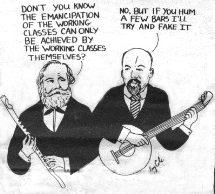I really wish I could be either enthused or appalled by the fact that Ed Miliband is now leader of the Labour Party. I know the ultra-Blairites, with their fellow travellers in the BBC and on the Murdoch Death Star, who rallied around his brother David as the next best thing to The World’s Favourite Money Grabbing War Monger, are shocked that their cunning plan failed (‘if it hadn’t been for you meddlin’ trade unions…’) Best make the best of a bad job chaps… and go and join the Conservative Party- Education Secretary Michael Gove for one seems pretty keen on embracing the Blair Legacy.
Anyway, ‘Red Ed’? Do me a favour! You may have heard the comment that his father Ralph Miliband claimed that socialism could not come through Parliamentary means and his two sons have gone around proving it in practice. Only in a country where most mainstream politicians are in such awe of a handful of mindlessly Thatcherite newspapers with declining circulations could someone like Ed Miliband be called a ‘Red’. It is a bit like Business Secretary Vince ‘privatise the Post Office’ Cable being called a ‘Marxist’ for criticising the City of London. If there is any sort of ‘Marxist’ class war in this country it is the City of London and its patsies in the mainstream media and the main political parties against the rest of us…
 Now if Vince had walked around the Square Mile with this placard…
Now if Vince had walked around the Square Mile with this placard…
Anyway, socialism is a real political swear word isn’t it? Sometimes I try and think if anything has not been tagged with the ‘s-word’ at some point. I realise that for a lot of people, ‘socialism’ is any form of state intervention in the economy. Sometimes this is expanded to include any state intervention in wider social life or state interventions abroad. I then wonder how it got to this. After all, most of the original socialists were often extremely anti-state…
Every couple of years or so I seem to repost this blogpost written in 2006 by Larry Gambone, a Canadian evolutionary anarchist who now lives in Nanaimo (that’s right isn’t it, Larry?), largely as a quick refresher for those who automatically think socialism = the state:
The Myth Of Socialism As Statism [May 6th 2006]
What did the original socialists envision to be the owner and controller of the economy? Did they think it ought to be the state? Did they favor nationalization? Or did they want something else entirely? Let’s have a look, going right back to the late 18th Century, through the 19th and into the 20th, and see what important socialists and socialist organizations thought.
*Thomas Spence – farm land and industry owned by join stock companies, all farmers and workers as voting shareholders.
* St. Simon – a system of voluntary corporations
* Ricardian Socialists – worker coops
* Owen – industrial coops and cooperative intentional communities
* Fourier – the Phlanistery – an intentional community
* Cabet – industry owned by the municipality (‘commune’ in French, hence commune-ism)
* Flora Tristan – worker coops
* Proudhon – worker coops financed by Peoples Bank – a kind of credit union that issued money.
* Greene – mutualist banking system allowing farmers and workers to own means of production.
* Lasalle – worker coops financed by the state – for which he was excoriated by Marx as a ‘state socialist’
* Marx – a ‘national system of cooperative production’
 Would that sound better on ‘The Apprentice’ or ‘The Dragon’s Den’, Karl?
Would that sound better on ‘The Apprentice’ or ‘The Dragon’s Den’, Karl?
* Tucker – mutualist banking system allowing farmers and workers to own means of production.
* Dietzgen – cooperative production
* Knights of Labor – worker coops
* Parsons – workers ownership and control of production
* Vanderveldt – socialist society as a ‘giant cooperative’
* Socialist Labor Party – industry owned and run democratically through the Socialist Industrial Unions
* Socialist Party USA – until late 1920’s emphasized workers control of production.
* CGT France, 1919 Program – mixed economy with large industry owned by stakeholder coops.
* IWW – democratically run through the industrial unions.
* Socialist Party of Canada, Socialist Party of Great Britain, 1904-05 program – common ownership, democratically run – both parties, to this very day, bitterly opposed to nationalization.
* SDP – Erfurt Program 1892 – Minimum program includes a mixed economy of state, cooperative and municipal industries. While often considered a state socialist document, in reality it does not give predominance to state ownership.
Well? Where’s the statism? All these socialisms have one thing in common, a desire to create an economy where everyone has a share and a say.
Why The Confusion
The state did play a role in the Marxist parties of the Second International. But its role was not to nationalize industry and create a vast bureaucratic state socialist economy. Put simply, the workers parties were to be elected to the national government, and backed by the trade unions, cooperative movement and other popular organizations, would expropriate the big capitalist enterprises. Three things would then happen:
1. The expropriated enterprises handed over to the workers organizations, coops and municipalities.
2.The army and police disbanded and replaced by worker and municipal militias.
3. Political power decentralized to the cantonal and municipal level and direct democracy and federalism introduced.
These three aspects are the famous ‘withering away of the state’ that Marx and Engels talked about.
The first problem with this scenario was that the workers parties never got a majority in parliament. So they began to water-down their program and adopt a lot of the statist reformism of the liberal reformers. Due to the Iron Law of Oligarchy the parties themselves became sclerotic and conservative. Then WW1 intervened, splitting the workers parties into hostile factions. Finally, under the baleful influence of the Fabians, the Bolsheviks and the ‘success’ of state capitalism in the belligerent nations, the definition of socialism began to change from one of democratic and worker ownership and control to nationalization and statism. The new post-war social democracy began to pretend that state ownership/control was economic democracy since the state was democratic. This, as we see from the list above, was not anything like the economic democracy envisaged by the previous generations of socialists and labor militants.
So there are ‘top-down’ and ‘bottom-up’ forms of socialism. I definitely identify with the latter type, while the former attracts the power hungry ‘socialist’, whatever his or her professed stripe (notice how many erstwhile ‘Bennites’ in the Labour Party thirty years ago became evangelicals for ‘Blairism’?). ‘Top-down’ socialists who identify with the Big State are a bit like ‘free marketeers’ who excuse Big Business rather than support independent trades people and the self-employed because, to use Kevin Carson’s mocking phrase, ‘Them pore ole bosses need all the help they can get.’ (Kevin A. Carson Studies in Mutualist Politcal Economyi, p.116)
Of course, to talk about a Non-Statist or Libertarian form of Socialism throws a lot of people. Well, here another phrase to throw about: ‘market collectivism.’ That is:
‘a community of producer cooperatives. Each cooperative is owned and run by the workers themselves. Their products are sold on a market. They purchase the required raw materials themselves. There is little or no central planning….a market collectivist society is not capitalist because….workers are self-managed; they do not work under the direct or indirect control of a capitalist. In addition the workers (collectively) own the product of their labour, which they bring to the market for sale.’ Geoff Hodgson The Democratic Economy, p.177.
The nearest to a ‘market collectivist’ economy any of us have seen is Yugoslavia under Tito. Now that eventually collapsed in the wars of the 1990s but how much did market collectivism have to do with it? I suspect the lack of political freedom and the plunging of the whole country into deep debt during the 1970s and 1980s had a much more profound effect in bringing about the death of Yugoslavia.
The main theorist of market collectivism is Jaroslav Vanek. An interview with him from the early 1990s, in which he says why it has been hard for co-operatives to take off in the West, can be found here.
So what is a pore ole Market Collectivist to do? I cannot think of a British political party that is opposed to co-operatives per se. However, are any of them likely to say in the foreseeable future that co-operatives should be the dominant enterprise model for the economy? I doubt it. Even the Co-operative Party is hobbled by its links to the Labour Party. Perhaps one should just keep plugging away and things will change. It is worth noting that the economic situation in recent years seems to have encouraged the growth of co-operatives in the US. This ‘bottom-up socialism’ is definitely better than the top-down ‘War Socialism’ which is encouraged by the Republican Party in the US:
The U.S. economy increasingly resembles the dual economy of the Soviet Union, with an overfunded military sector and a chronically weak, dysfunctional civilian sector. Like the Soviet Union in its decline, we are bogged down in an unwinnable conflict in Afghanistan. The Soviet system was supported to the end, however, by Soviet military and intelligence personnel and defense factory workers and managers. Their equivalents exist in America. Conservatives are not being irrational, when they ignore the civilian economy while fostering the military economy that provides orders and jobs to many of their constituents. Theirs is the logic of Soviet-style conservatism.
‘Watch what we say, not what we do,’ Richard Nixon’s Attorney General John Mitchell famously remarked. Out of power, the Republican Party preaches Ron Paul-style libertarianism. In power, the party practices Martin Feldstein-style military Keynesianism and military socialism — and Hank Paulson-style financial sector Keynesianism and socialism.
Anyway, I’ll leave it there. I do not expect to quickly change the minds of those who think socialism must always = the state, but I’ll give it a go!
Update: Suzanne Moore goes down memory lane with Da Brudders:
I have vague recollections of the Milibands thousands of years ago when I worked at Marxism Today. There were many young men around who made the transition from Communist Party backgrounds to New Labour without much trouble. It simply required a degree of faith and opportunism.
There is still to be a good book written on how a load of erstwhile self-proclaimed ‘Marxists’ (whether from a Communist or Trotskyite background) and/or ‘Hard Left’ activists (Freud would have a field day) ended up supporting the largely pro-City of London/Big Business agenda of New Labour. They took on different ideals and goals but used the similar methods to achieve them. Discuss.






 Someone has got their priorities right!…
Someone has got their priorities right!…




